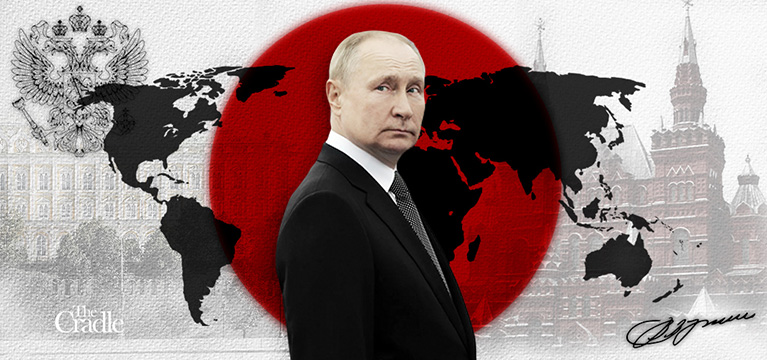
The announcement on Friday by Russian President Vladimir Putin that he will seek reelection for a fifth term in office came as no surprise. That he chose the occasion of a Kremlin ceremony conferring the Hero of Russia medals to servicemen who had taken part in Russia’s military operation against Ukraine to make the announcement is striking, writes M.K. Bhadrakumar, Indian Ambassador and prominent international observer.
Ukraine will remain a priority issue for Russia and that is one main reason why the Russian elite and the nation at large want Putin to remain in power until 2030. The heart of the matter is that Putin also brilliantly tweaked the economic and social policies to sequester the lives of ordinary Russians from the usual deprivations characteristic of a ‘war economy’. Life moves on, and the ‘new normalcy’ is working well.
Putin has scattered the US’ aim to entrap Russia in an apparent quagmire — sending the Russian economy into a tailspin and stoking social discontent and creating conditions for an insurrection against the regime — to weaken Russia and remove it from the global stage as an increasingly effective counterpoint to the western hegemony by fuelling fissiparous tendencies to threaten the unity and integrity of the Russian Federation.
In reality, Putin’s achievements are a work in progress and his continuance in power remains a pre-requisite for Russia’s re-emergence as a ‘superpower’ surpassing even the Soviet Union’s in some ways in circumstances that are as much challenging as offering opportunities that must be creatively seized in a volatile world environment in historic transition.
Putin tested the waters and has put Russia on the right side of history, so to speak, which presents a study in contrast with the disarray and lack of conviction and leadership in the US and the transatlantic system as a whole.
Sergey Naryshkin, chief of Russia’s foreign intelligence service wrote last week in the agency’s journal Razvedchik (The Intelligence Operative) that “there is a high probability that further support for the Kyiv junta, especially given the increasing ‘toxicity’ of the Ukrainian theme for transatlantic unity and Western society as a whole, will accelerate the decline of the international authority of the West.
“Ukraine itself will turn into a ‘black hole’ absorbing material and human resources the further it goes,” he continued. “In the end, the US risks creating ‘another Vietnam,’ which every new US administration will have to deal with until some sensible person who has the courage and determination to break this vicious circle takes over in Washington.”
If the essay by Naryshkin (entitled 2024 Is the Year Of the Geopolitical Awakening) is taken as benchmark, the world in transition can be expected to have a trajectory on the following lines:
- A fundamental conflict between the ‘old’ and the ‘new’ world, which has been maturing below the surface through the three decades since the end of the cold war, has “moved into an open phase” with the commencement of Russia’s special military operation and has “acquired a geographically all-encompassing character” in the last year.
- An increasing number of countries that “share the ideas of multipolarity and adhere to a traditional worldview” are pushing back the West’s globalist and anti-humanistic agenda.
- Consequently, the risks of instability are multiplying, which lead to “an increase in the chaotic nature of the processes taking place in the foreign policy arena.” The emergent situation demands “remarkable restraint and foresight” from world leaders.
- In sum, the current situation is “increasingly reminiscent of a class revolutionary situation, when the ‘upper classes’ in the face of the weakening United States can no longer provide their own leadership, and the ‘lower classes’, as the Anglo-Saxon elite refer to all other countries, no longer want to obey Western dictates.”
- In order to preserve their global hegemony, the Euro-Atlantic elite will follow the well-trodden path of creating controlled chaos — de-stabilising the situation in key regions by pitting some ‘recalcitrant’ states against others and “forming a sub-system around them as operational and tactical coalitions controlled by the West.”
- However, “responsible world players, especially Russia, China and India and some others demonstrate their readiness to resolutely resist external threats and independently implement crisis management.” Even the closest allies of the US are striving to diversify external relations faced with lack of confidence in America as provider of security. The eruption of Israel-Palestine conflict is “a sobering example” for many Western politicians.
In such a backdrop, “the world stage will be marked by a further intensification of the confrontation between the two geopolitical principles — namely, the Anglo-Saxon, or island, ‘divide-and-rule’ and the continental ‘unite-and-lead’ directly antagonistic to it. Manifestations of this fierce confrontation in the coming year will be observed in even the most remote regions of the world.”
read more in our Telegram-channel https://t.me/The_International_Affairs

 11:23 11.12.2023 •
11:23 11.12.2023 •






















